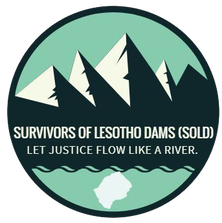A SHORT HISTORY
Survivors of Lesotho Dams (SOLD), was founded in 2004 after the World Summit for Sustainable Development in South Africa. It is a registered, ecumenical, non-profit making and non-governmental organisation committed to working for justice, good governance, and inclusiveness and participation in decisions that affect communities affected by dams and other large infrastructure developments.
SOLD was formed upon the realisation of the following observations:
SOLD has two major programmes:
WHAT WE DO
WHAT WE ADVOCATE FOR
Survivors of Lesotho Dams (SOLD), was founded in 2004 after the World Summit for Sustainable Development in South Africa. It is a registered, ecumenical, non-profit making and non-governmental organisation committed to working for justice, good governance, and inclusiveness and participation in decisions that affect communities affected by dams and other large infrastructure developments.
SOLD was formed upon the realisation of the following observations:
- Injustices brought by the compensation policies for people affected by dams and other large infrastructure development projects
- Negative impacts of the construction of dams and large development projects
- Non-participation of project affected people
- Lack of information provided to those affected by dams and large infrastructure development projects
- Absence of an umbrella organisation to speak in one voice and to magnify community voices against injustices and exclusion from the decision making processes
SOLD has two major programmes:
- Water and Environment Justice Programme
- Advocacy and Dam Monitoring Programme
WHAT WE DO
- Monitor the social and environmental impacts of dams.
- Deliver a ‘good governance and democracy’ programme by bus which targets young people in Lesotho and political parties, the latter is served through SOLD’s programme on political education in schools and other democratic institutions.
- Anti corruption monitoring in large infrastrcutre development projects.
- Promoting constitutionalism and the rule of law, this is inclusive of educating young people and political parties on the strengthening of democracy within Leostho’s political parties.
- Monitor compensation and resettlement in dams, mines, and other large infrastructure development projects.
- Pass on knowledge, skills and experiences relating to the Lesotho Highlands Water Project (LHWP) to Leostho’s next generation.
- Conduct research and documentation of communities’ experiences, concerns, fears and lessons in dams, mines and other large infrastructure development projects.
- Review of Enviromental Impact Assessments (EIAs) of dams, mines and other large infrastructure development projects.
- Facilitate visits and exchange programmes locally, regionally and internationally.
- We are experts and specialists in the Lesotho Highlands Water Project (LHWP) Treaty.
- We are experts and specialists in public participation and stakeholder engagement.
- We are lobbying and advocacy practitioners.
- We lead the community celebrations to recongise International Civil Society Water Day.
WHAT WE ADVOCATE FOR
- Water and sanitation to become constitutional rights in Lesotho.
- Establishment of the Public Participation Act.
- Inculcating the values of peace, tolerance, and valuing a difference of opinion.
- Share of royalties from the sale of water provided by the Lesotho Highlands Water Project (LHWP), and royalties from mines and other large infrastructure development projects, to be provided to the communities.
- Implementation of the ‘30 litres’ as stipulated by the Lesotho Water and Sanitation Policy, 2007.
- Full disclosure and rights to knowledge of dams and mining activities.
- Participation and inclusiveness in decision making and decision taking.
- Participate in the governance, including at board level, of Lesotho’s natural resources.
- Domestication of Conventions on Water, Wetlands, Desertification, Biodiversity and Climate Change.
- Protection and management of wetlands, freshwater resources and catchments.
- Litigation where necessary to deliver justice for communities affected by dams, mines and other large infrastructure development projects.
